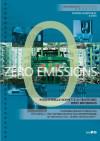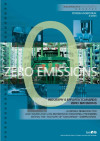Suchergebnisse
Industrially produced residential dwellings

Potential of future development for industrially produced residential dwellings Enquiry on international tendencies in automated manufacturing and assessment of viable strategies for their implementation into the Austrian building sector
Optimierung Dehydratisierungstechnologie

Die Studie untersucht den Stand der Dehydratisierungstechnologie in Österreich, evaluiert diese nach technischen, wirtschaftlichen und ökologischen Kriterien und legt die weiteren möglichen Entwicklungspfade des Sektors dar.
Wissensbasierte Sortierung von Blütenpollen
Blütenpollen für medizinische Anwendungen können von speziellen Maschinen sortiert werden. Eine integrierte Datenbank und spektrometrischer Abgleich erlauben eine präzise Trennung von Blütenpollen mit Bestimmung der Pflanzenarten.
Berichte aus Energie- und Umweltforschung 15/2001 Umweltverträgliche Kältemittel

Thermodynamische Stoffwerte und Transportgrößen von umweltverträglichen Kältemitteln
Industriell produzierte Wohnbauten

Untersuchung der Entwicklungspotentiale für industriell produzierte Wohnbauten. Recherche internationaler Fertigungsentwicklungen und Untersuchung möglicher Umsetzungsstrategien für die österreichische Wohnbauwirtschaft.
Knowledge based determination of plant species
Pollen for medical applications can be sorted by special machines. An integrated database and a spectrometric calibration allow a precise separation of the species with an identification of the plant species.
Linking Low Carbon Technologies with Low Carbon Society

The project „Linking Low Carbon Technologies with Low Carbon Society“ was conducted on behalf of the Federal Ministry of Transport, Innovation and Technology. In the course of the project a number of recent empirical studies on rebound effects were analysed. Based on this comprehensive analysis an overview of strategies for rebound management was compiled and policy recommendations for the technology sector were developed.
FABRIK der Zukunft Hintergrundband Teil 1
Der vorliegende Hintergrundband soll einen umfassenden Überblick über die hervorragenden Ergebnisse aus der Programmlinie "Fabrik der Zukunft" geben, wobei insbesondere die Projekte der 1. und 2. Ausschreibung der Programmlinie dargestellt werden.
Anforderungen an die Technologiepolitik zur Eindämmung des Rebound-Effektes

Das Projekt "Linking Low Carbon Technologies with Low Carbon Society" wurde vom Österreichischen Institut für Nachhaltige Entwicklung im Auftrag des Bundesministeriums für Verkehr, Innovation und Technologie durchgeführt. Im Zuge des Projektes wurden der Stand der Forschung zu Rebound-Effekten dokumentiert, eine Rebound-Systematik erstellt und Empfehlungen für die Technologiepolitik abgeleitet.
Integration methods for solar heat into industrial production processes
The project aims at the development of integration methods for solar heat into industrial production process with batch operations as typical for SMEs
Holzbearbeitung mit Überlagerung einer Ultraschall-Wechselbeanspruchung
Entwicklung von Verfahren zur Holzbearbeitung unterstützt durch hochfrequente Ultraschallvibration in Hinsicht auf Anwendungen in der holzverarbeitenden Industrie.
Wood-processing employing a superimposition of ultrasonic vibrations
Development of wood-processing techniques employing high-frequency ultrasonic vibrations in terms of applications in the woodworking industry.
Production of bioethanol in addition with heat, power and valuable byproducts
The production of bioethanol in Bruck/Leitha in addition to the production of heat, power and valuable by-products from biomass will be optimized by a new process simulation tool under the target of maximum usage of waste and low temperature heat and optimal source and product usage.
Abwärmenutzung und Einsatz erneuerbarer Energieträger in einem metallverarbeitenden Betrieb
Abwärmenutzung und Deckung des verbleibenden Energiebedarfes zu 100% aus erneuerbaren Energieträgern Biomasse und Wasserkraft in einem metallverarbeitenden Betrieb
Waste heat utilisation and use of renewable energy sources in a metal-working enterprise
Use of waste heat and covering of the remaining energy demand by the renewable energy sources hydropower and biomass in a metal-processing company.
Green Biorefinery - Separation of Lactic Acid from Grass Silage Juice (Brown Juice)
Development of a technical process to separate lactic acid from Brown Juice. Lactic acid is a promising chemical commodity which may be produced from silage juice at low costs and in an environmentally friendly way for subsequent synthesis of valuable products.
Umweltfreundliche Harzimprägnierung elektrischer Maschinen mittels Stromwärme
Die Wicklungen elektrischer Maschinen und Generatoren (z. B. Wind- und Wasserkraftgeneratoren) müssen in eine Harzmatrix eingebettet werden. Dazu soll ein neues Verfahren untersucht werden, welches die Erwärmung durch Widerstandsheizung nutzt. Dieses Verfahren hat einen sehr hohen Wirkungsgrad und führt durch schnelle Harzgelierung zu sehr geringen Emissionen.
Grüne Bioraffinerie - Gewinnung von Milchsäure aus Grassilagesaft
Erforschung eines technischen Verfahrens zur Milchsäuregewinnung aus Grassilagen. Milchsäure, eine vielversprechende ökologische Basischemikalie, wird aus fermentierter Grünmasse kostengünstig gewonnen, um zu hochwertigen Produkten weiterverarbeitet werden zu können.
Industrielle Schritte In Richtung Zero Emissions

Österreichische Forschung für abfall- und emissionsarme Industrieprozesse im Rahmen von "Fabrik der Zukunft"
Forschungsforum
3/2004
Herausgeber: BMVIT
Deutsch, 6 Seiten
Downloads zur Publikation
Industry´s Efforts Towards Zero Emissions

Austrian Research for Low-Waste and Low-Emissions in Industrial Processes within the "Factory of Tomorrow" Subprogram
Forschungsforum
3/2004
Herausgeber: BMVIT
Englisch, 6 Seiten
